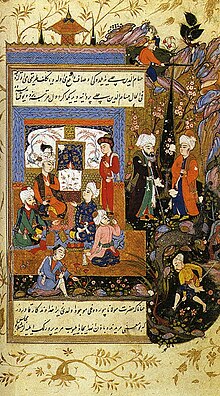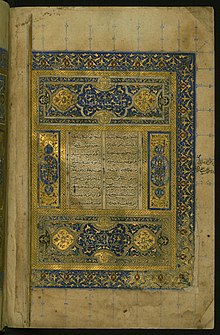Romanus (poeta Persicus)





Romanus[1][2] (Persice جلالالدین محمد رومی Jalāl ad-Dīn Muhammad Rūmī[3]), e litteris Persicis populo gratissime Rumi tantum appellatus (natus Balkh in hodierna Afgania aut Vakhsh in hodierna Tadzikistania[4] in Imperio Khwarezmiano die 30 Septembris 1207; mortuus Iconii in hodierna Turcia in Sultanatu Romano die 17 Decembris 1273), fuit poeta, iurista, eruditus Islamicus, theologus, et mysticus Sufiensis Persicus[5][6] Sunniticus[7] saeculi tredecimi, e Maiore Khorasan? ortus.[6][8] Cuius auctoritas fines nationales identitatesque ethnicas superat: quia Iraniani, Tadzici, Turci, Graeci Cappadociani, Pashtuni, alii gentes Mediae Asiae, et Musulmani Asiae Meridianae eius legatum spiritualem septem saecula magni existimant.[9]
Eius poemata in multas e linguis orbis terrarum conversa atque in varias formas transposita sunt. Romanus quidem appellatur poeta populo gratissimus[10][11] et poeta optime veniens[12] in Civitatibus Foederatis.[13][14]
Nexus interni
- Caeci et elephas
- Sant Mat (Doctrina sanctorum)
- Symphonia 3 (Szymanowski)
- De cultura Persica
- Philosophia Iraniae
- Litterae Persiae
- Mysticismus Persicus
- Tadzici
- Eruditi et scriptores de Romano
- Hamid Algar
- Rahim Arbab
- Gulielmus Chittick
- Badiozzaman Forouzanfar
- Hossein Elahi Ghomshei
- Fatemeh Keshavarz
- Majid M. Naini
- Seyyed Hossein Nasr
- Franklinius Lewis
- Franciscus Pétis de la Croix
- Annamaria Schimmel
- Dariush Shayegan
- Abdolkarim Soroush
- Abdolhossein Zarinkoob
- Anglici poematum Romani interpretes
- Arthurus Ioannes Arberry
- Gulielmus Chittick
- Ravan A. G. Farhadi
- Nader Khalili
- Daniel Ladinsky
- Franklinius Lewis
- Majid M. Naini
- Reynold A. Nicholson
- Iacobus Redhouse
- Shahram Shiva
- Interpretes Romani
- Coleman Barks
- Shohreh Moavenian
- Shahram Shiva
- Omer Tarin
Notae
- ↑ Claudius Salmasius, De Hellenistica commentarius, controversiam De Lingua Hellenistica decidens, & plenissime pertractans Originem & Dialectos Graecae Linguae (Lugduni Batavorum: Ex Officina Elseviriorum, 1643), 382.
- ↑ "The Anatolian peninsula which had belonged to the Byzantine, or eastern Roman empire, had only relatively recently been conquered by Muslims and even when it came to be controlled by Turkish Muslim rulers, it was still known to Arabs, Persians and Turks as the geographical area of Rum. As such, there are a number of historical personages born in or associated with Anatolia known as Rumi, a word borrowed from Arabic literally meaning 'Roman,' in which context Roman refers to subjects of the Byzantine Empire or simply to people living in or things associated with Anatolia" (Lewis 2008:9).
- ↑ Etiam Jalāl ad-Dīn Muhammad Balkhī (Persice جلالالدین محمد بلخى), Mevlânâ / Mawlānā (Persice مولانا 'magister noster'), Mevlevî / Mawlawī (Persice مولوی 'magister meus') appellatus.
- ↑ William Harmless, Mystics, (Oxford University Press, 2008), 167.
- ↑ H. Ritter et A. Bausani (2007), "ḎJ̲alāl al-Dīn Rūmī b. Bahāʾ al-Dīn Sulṭān al-ʿulamāʾ Walad b. Ḥusayn b. Aḥmad Ḵh̲aṭībī," Encyclopaedia of Islam, ed. P. Bearman, Th. Bianquis, C. E. Bosworth, E. van Donzel, et W. P. Heinrichs (Brill Online), pars: "known by the sobriquet Mewlānā, persian poet and founder of the Mewlewiyya order of dervishes."
- ↑ 6.0 6.1 Lewis 2008: 9. "How is that a Persian boy born almost eight hundred years ago in Khorasan, the northeastern province of greater Iran, in a region that we identify today as in Central Asia, but was considered in those days as part of the greater Persian cultural sphere, wound up in central Anatolia on the receding edge of the Byzantine cultural sphere, in what is now Turkey, some 1,500 miles to the west?
- ↑ The Complete Idiot's Guide to Rumi Meditations (Penguin Group), 48.
- ↑ Schimmel 1994: 51.
- ↑ Seyyed, Hossein Nasr (1987). Islamic Art and Spirituality. Suny Press. p. 115: "Jalal al-Din was born in a major center of Persian culture, Balkh, from Persian speaking parents, and is the product of that Islamic Persian culture which in the 7th/13th century dominated the 'whole of the eastern lands of Islam and to which present day Persians as well as Turks, Afghans, Central Asian Muslims and the Muslims of the Indo-Pakistani subcontinent are heir. It is precisely in this world that the sun of his spiritual legacy has shone most brillianty during the past seven centuries. The father of Jalal al-Din, Muhammad ibn Husayn Khatibi, known as Baha al-Din Walad and entitled Sultan al-'ulama', was an outstanding Sufi in Balkh connected to the spiritual lineage of Najm al-Din Kubra."
- ↑ Anglice "most popular poet."
- ↑ Charles Haviland (2007-09-30). "Theroar of Rumi—800 years on". BBC News
- ↑ Anglice "best selling poet."
- ↑ Ciabattari, Jane (21 October 2014). "Why is Rumi the best-selling poet in the US?". BBC News.
- ↑ Tompkins, Ptolemy (2002-10-29). "RumiRules!".
Bibliographia
Commentarii in Anglicum conversi
- Arberry, A. J., interpres. 2009. Mystical Poems of Rumi. Sicagi: University of Chicago Press.
- Banani, Amin, et Anthony A. Lee, interpretes. 2014. Rumi: 53 Secrets from the Tavern of Love: Poems from the Rubaiyat of Mowlana Rumi. White Cloud Press. ISBN 978-1-940468-00-6.
- Barks, Coleman, interpres. 2002. The Soul of Rumi: A New Collection of ECS+A+IC Poems. Harper One.
- Barks, Coleman, interpres, cum John Moyne, A. J. Arberry, et Reynold Nicholson. 1996. The Essential Rumi. Franciscopoli: Harper Collins. ISBN 978-0-06-250959-8.
- Barks, Coleman, interpres, cum John Moyne, A. J. Arberry, et Reynold Nicholson. 1997. The Essential Rumi. Edisoniae Novae Caesareae et Novi Eboraci: Castle Books. ISBN 978-0-7858-0871-8.
- Barks, Coleman, cum Michael Green, interpretes. 1997. The Illuminated Rumi. Novi Eboraci: Broadway Books. ISBN 978-0-7679-0002-7.
- Chittick, William, interpres. 1983. The Sufi Path of Love: The Spiritual Teachings of Rumi. Albaniae Novi Eboraci: SUNY Press.
- Ergin, Nevit Oguz, et Divan-i-kebir, interpretes. 2003. Divani Shamsi Tabriz. Echo Publications. ISBN 978-1-887991-28-5.
- Ergin, Nevit Oguz, et Will Johnson, interpretes. 2007. The rubais of Rumi: insane with love. Rochester Montis Viridis: Inner Traditiona. ISBN 978-1-59477-183-5.
- Gamard, Ibrahim W., et A. G. Rawan Farhadi, interpretes. 2008. The quatrains of Rumi: Complete translation with Persian text, Islamic mystical commentary, manual of terms, and concordance.
- Mojaddedi, Jawid, interpres. 2004. The Masnavi: Book One. Oxford World's Classics Series. Oxoniae: Oxford University Press. ISBN 978-0-19-280438-9.
- Mojaddedi, Jawid, interpres. 2007. The Masnavi: Book Two. Oxford World's Classics Series. Oxoniae: Oxford University Press. ISBN 978-0-19-921259-0.
- Naini, Majod M., interpres. 2002. The Mysteries of the Universe and Rumi's Discoveries on the Majestic Path of Love. Universal Vision & Research. ISBN 978-0-9714600-0-3. www.naini.net Situs interretialis.
- Nicholson, Reynold A., interpres. 1925–1940. The Mathnawí of Jalálu'ddín Rúmí, edited from the oldest manuscripts available, with critical notes, translation and commentary. 8 vol. Londonii: Messrs Luzac & Co. Textus Persice impressus.
- Redhouse, James W. 1881. The Mesnevi of Mevlâna Jelālu'd-dīn er-Rūmī: Book first, together with some account of the life and acts of the Author, of his ancestors, and of his descendants, illustrated by a selection of characteristic anecdotes, as collected by their historian, Mevlâna Shemsu'd-dīn Ahmed el-Eflākī el-'Arifī.
- Saheb, Hazrat Maulana Hakim Muhammad Akhtar, interpres. 1997. Ma-Aarif-E-Mathnavi A commentary of the Mathnavi of Maulana Jalaluddin Rumi.
- Shah, Idries, interpres. 1978. The Hundred Tales of Wisdom. Ex Manāqib ul-Ārefīn Aflākī. Octagon Press.
- Shiva, Shahram, interpres. 1995. Rending The Veil: Literal and Poetic Translations of Rumi. Hohm Press. ISBN 978-0-934252-46-1.
- Shiva, Shahram, interpres. 1999. Hush, Don't Say Anything to God: Passionate Poems of Rumi. Jain Publishing. ISBN 978-0-87573-084-4.
- Whinfield, E. H., editor et interpres. (1887) 1989. Masnaví-i Ma'naví, the Spiritual Couplets of Mauláná Jalálu'd-din Muhammad Rúmí. Editiones interretiales: sacred-texts.com, archive.org, wikisource.
- Wilson, C. E., interpres. 1910. The Masnavī by Jalālu'd-din Rūmī. Book II, translated for the first time from the Persian into prose, with a Commentary. Londonii.
Vita et opera
- Arasteh, Abdol Reza. (1963) 2013. Rumi the Persian, the Sufi. Novi Eboraci: Routledge.
- Can, Şefik. 2004. Fundamentals of Rumi's Thought: A Mevlevi Sufi Perspective.', Sommerset Novae Caesareae: The Light. ISBN 978-1-932099-79-9.
- Chittick, William. 2005. The Sufi Doctrine of Rumi: Illustrated Edition. Bloomingtoniae: World Wisdom.
- Chopra, R. M. Rumi's Tasawwuf and Vedanta. Indo Iranica 60.
- Hakim, Khalifa Abdul, 1959. The metaphysics of Rumi: A critical and historical sketch. Lahorii: The Institute of Islamic Culture. ISBN 978-8-17435-475-4. https://web.archive.org/web/20140110200842/http://fr.scribd.com/doc/63710285/The-Metaphysics-of-Rumi-a-Critical-and-Historical-Sketch [Web Archive.]
- Iqbal, Afzal. 1959. The Life and thought of Mohammad Jalal-ud-Din Rumi. Lahorii: Bazm-i-Iqbal.
- Iqbal, Afzal. 2014. The life and work of Jalal-ud-Din Rumi. Kuala Lumpur: The Other Press.
- Keshavarz, Fatemeh. 1998. Reading Mystical Lyric: The Case of Jalal al-Din Rumi." University of South Carolina Press. ISBN 978-1-57003-180-9. Google Books.[nexus deficit]
- Lewis, Franklin. 2000. Rumi: Past and Present, East and West. Oneworld Publication. ISBN 978-1-85168-214-0.
- Lewis, Franklin D. 2008. Rumi: Past and Present, East and West: The life, Teaching and poetry of Jalal Al-Din Rumi. Oneworld Publication.
- Lewis, Franklin. 2008. Rumi: Past and Present, East and West: The Life, Teachings and Poetry of Jalal al-Din Rumi. Oneworld Publication.
- Naini, Majid M. 2002. The Mysteries of the Universe and Rumi's Discoveries on the Majestic Path of Love. Universal Vision & Research. ISBN 978-0-9714600-0-3.
- Nasr, Seyyed Hossein. 1987. Islamic Art and Spirituality. Albaniae Novi Eboraci: SUNY Press.
- Safavi, Seyed G., ed. 2003. Rumi's Thoughts. Londinii: London Academy of Iranian Studies.
- Schimmel, Annemarie. 1992. I am wind, you are fire: the life and work of Rumi. Bostoniae: Shambala. ISBN 0877736111.
- Schimmel, Annemarie. 1993. The Triumphal Sun: A Study of the Works of Jalaloddin Rumi. Albaniae Novi Eboraci: SUNY Press.
- Sideris, Athanasios. 2003. Mevlana Celaleddin Rumi. Encyclopedia of the Hellenic World – Asia Minor.
- Wines, Leslie. 2001. Rumi: A Spiritual Biography. Novi Eboraci: Crossroads. ISBN 978-0-8245-2352-7.
Periodica
- Mawlana Rumi Review. Periodicum quotannis prolatum. Archetypus, 2010. ISBN 978-1-901383-38-6.
Studia comparativa
- Katz, Steven T. 2011. Comparative Mysticism: An Anthology of Original Sources. Novi Eboraci: Oxford University Press.
- Zarrabi-Zadeh, Saeed. 2016. Practical Mysticism in Islam and Christianity: A Comparative Study of Jalal al-Din Rumi and Meister Eckhart. Londinii et Novi Eboraci: Routledge. Routledge Products.
Litterae Persicae
- Browne, E. G. 1998. Literary History of Persia. 4 vol. ISBN 978-0-7007-0406-4. Google Books.
- Chopra, R. M. 2007. "Rumi: His Teachings And Philosophy." Kolkatae: Iran Society.
- Rypka, Jan. 1968. History of Iranian Literature. Reidel Publishing Company. OCLC 460598. ISBN 978-90-277-0143-5.
Nexus externi
- Opera auctore "Romanus (poeta Persicus)" apud gutenberg.org reperta
- Dar al Masnavi, nonnullae versiones Anglicae a variis interpretibus factae.
- Poemata Romani Anglice in Academia Poetarum Americanorum data.
- Masnavi-e Ma'navi Persice a Mohammad Ghanbar recitatus.